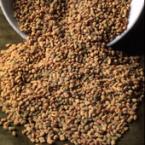Fenugreek

On this page:
Introduction
This fact sheet provides basic information about fenugreek—common names, what the science says, potential side effects and cautions, and resources for more information.
The first recorded use of fenugreek is described on an ancient Egyptian papyrus dated to 1500 B.C. Fenugreek seed is commonly used in cooking. Historically, fenugreek was used for a variety of health conditions, including menopausal symptoms and digestive problems. It was also used for inducing childbirth. Today, fenugreek is used as a folk or traditional remedy for diabetes and loss of appetite, and to stimulate milk production in breastfeeding women. It is also applied to the skin for inflammation.
The dried seeds are ground and taken by mouth or used to form a paste that is applied to the skin.
What the Science Says
- A few small studies have found that fenugreek may help lower blood sugar levels in people with diabetes.
- There is not enough scientific evidence to support the use of fenugreek for any other health condition.
Side Effects and Cautions
- Possible side effects of fenugreek when taken by mouth include gas, bloating, and diarrhea. Fenugreek can cause irritation when applied to the skin.
- Given its historical use for inducing childbirth, women should use caution when taking fenugreek during pregnancy.
- Tell all your health care providers about any complementary health practices you use. Give them a full picture of what you do to manage your health. This will help ensure coordinated and safe care. For tips about talking with your health care providers about complementary and alternative medicine, see NCCAM's Time to Talk campaign.
Search the scientific literature for potential herb-drug interactions
Sources
- Fenugreek. Natural Medicines Comprehensive Database Web site. Accessed at www.naturaldatabase.com on August 18, 2009.
- Fenugreek (Trigonella foenum-graecum L. Leguminosae). Natural Standard Database Web site. Accessed at www.naturalstandard.com on August 13, 2009.
- Fenugreek seed. In: Blumenthal M, Goldberg A, Brinckman J, eds. Herbal Medicine: Expanded Commission E Monographs. Newton, MA: Lippincott Williams & Wilkins; 2000:130–133.
For More Information
NCCAM Clearinghouse
The NCCAM Clearinghouse provides information on NCCAM and complementary health approaches, including publications and searches of Federal databases of scientific and medical literature. The Clearinghouse does not provide medical advice, treatment recommendations, or referrals to practitioners.
PubMed®
A service of the National Library of Medicine (NLM), PubMed® contains publication information and (in most cases) brief summaries of articles from scientific and medical journals.
Office of Dietary Supplements (ODS), National Institutes of Health (NIH)
ODS seeks to strengthen knowledge and understanding of dietary supplements by evaluating scientific information, supporting research, sharing research results, and educating the public. Its resources include publications (such as Dietary Supplements: What You Need to Know), fact sheets on a variety of specific supplement ingredients and products (such as vitamin D and multivitamin/mineral supplements), and the PubMed® Dietary Supplement Subset.
This publication is not copyrighted and is in the public domain. Duplication is encouraged.
* Note: PDF files require a viewer such as the free Adobe Reader.
